King & Conqueror is the story of a clash that defined the future of a country – and a continent – for a thousand years, the roots of which stretch back decades and extend out through a pair of interconnected family dynasties, struggling for power across two countries and a raging sea.
Harold of Wessex (James Norton) and William of Normandy (Nikolaj Coster-Waldau) were two men destined to meet at the Battle of Hastings in 1066; two allies with no design on the English throne, who found themselves forced by circumstance and personal obsession into a war for possession of its crown.
All episodes are available on ��ѿ��ý iPlayer from 6am on Sunday 24 August, with the first episode airing on ��ѿ��ý One that evening.
MF3
Meet the King & Conqueror Cast and Creatives
James Norton (Harold of Wessex and Executive Producer)

What drew you to the part of Harold Godwinson?
Initially it was the story, rather than specifically Harold, that drew me to the project. We chatted about the idea for this show seven or eight years ago, and the first reaction I had was ‘how has this story not been told before in TV or film?’ It's one of the biggest dates we learn in history at school. It has defined so much of our culture, politics and law, the fabric of this country.
Then in terms of Harold, in those early chats, Mike [lead writer] had seen Harold as a brutish man, a ball of muscle, energy and aggression. Over the development process the character became more and more nuanced, and the relationships he has with Edith and his family allowed us a way into the complexity of this man and the reasons behind his relentless pursuit of power. Luckily by the end of the development process, it was a complete no-brainer for me – I was so right for Harold and Nikolaj, who came on a little bit later than I did, was so right for William.
How did you prepare to portray Harold? Did you do much research?
We’ve done so much work and research, and so much of that has come through Mike’s writing. I remember being constantly surprised reading scripts and saying ‘is this real? This seems completely mad,’ and invariably, he'd be like, ‘no, that is exactly what happened.’ It was extraordinary. There were obviously artistic licenses that we had to take, particularly in terms of the timeline, because you often have to condense chapters with historical dramas like this.
It was also about finding specificity and nuance. We know about the broad brush strokes of Stamford Bridge and the Battle of Hastings, but you don't really get much about an individual from the Bayeux Tapestry and the wider historical facts. The meat and substance is always found in the domestic space. Through Mike's incredible writing and his extraordinary research I had a very clear route into the man and his private world and his domestic space. I remember being on the battlefield as the embodiment of Harold with the benefit of a thousand years of hindsight and thinking ‘if only he knew how significant this particular moment was going to be.’
Did you have the opportunity to film any stunt work?
We had an amazing stunt coordinator called Jon Vidar. I know lots of people talk about this in terms of period drama, but we really did spend a lot of time and attention making it feel as authentic as possible – the mud and blood, the sweat and the tears – we didn’t want it to feel like a pristine, precious period drama. We wanted it to feel gritty.
The slow, sluggish movements of fighting in those costumes was real. Jon’s team really took that to heart, and we worked really hard at making everything feel messy and of the period, and not sensationalist or overly choreographed. We trained hard, Nikolaj and I both did a lot of sessions. And a lot of horse riding!
Were there any funny or memorable moments on set?
The weather was always a challenge. It was impossible to predict what the weather was going to do and how to prepare for it – one day you'd need thermal pads underneath your armour, and the next you'd be desperate for a fan and cold patches on your neck. I became a part of this community of cold swimmers in Reykjavik. They were hardcore, I became friends with some of them. Wherever you are in Iceland, you're always near a beach, pond, pool or somewhere to swim, so for me it was a dream.
Could you tell us about the relationship between Harold and William? What was it like working with Nikolaj?
We know they became friends. They were kindred spirits in this new generation of leaders in Europe, and the fact that they fought alongside each other, brothers in arms, in Normandy, gives us a lot in terms of how close they had become, and then how this reversed by the time they got to the Battle of Hastings. Nikolaj is a brilliant actor and a wonderful man. We had Team Harold and Team William – we would jokingly spar about which storyline was more interesting.
We playfully leant into the head butting that Harold and William naturally do in the script, and as a result, there was a gentle, boyish competitiveness between the two of us. We hung out a lot and went jet skiing – I remember racing him across the water and thinking ‘this is very Harold of me!’ But generally a happy and healthy working relationship, full of mutual respect. He’s a real powerhouse in the industry, his commitment to directing episode five was extraordinary. The actors, including me, loved being directed by him, because it was both well prepared and specific, but when you have an actor directing there's a certain empathy that comes through.
I met President Emmanuel Macron recently at the event at the British Museum where the Bayeux Tapestry is being moved to, and I was very quick to reassure him that we had told the French story, the Norman story, with as little bias as possible. There are a lot of stories about William post the Battle of Hastings itself, and how he acted pretty monstrously, but there's no doubt that he had his own domestic space, his relationship with Matilda and his son. Nikolaj brought so much complexity to that role, and as a result, I think that the show feels balanced.
We didn't want one hero or one villain, we wanted the audience to be split and we wanted people to sit on the sofa and have someone on Team Harold and someone on Team William. I said to Macron: ‘I promise you that we have been fair in depicting both sides of the story’, and a lot of that was to do with Nikolaj’s brilliant, sensitive performance.
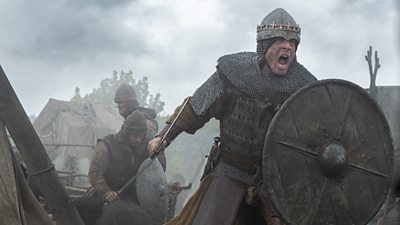
Was what the experience being on set like?
Because of the nature of the shoot, there were inevitably days which were the ‘Godwinson days’, and then William's family and his days. And so, without being in any way exclusive, there were little tribes which kind of emerged. We became a little family, and that has kind of continued to exist, we've had little Godwin family dinners.
I always think that to do our job well, a lot of it is about the connections that you make off camera. There was just a lot of giggling, we just could not stop occasionally misbehaving! The reality of our friendships then became the reality of our dynamic, where art meets life and vice versa. And we had a lot of time when they were shooting the Norman storylines, so as a family we would go on trips. Emily [Beecham], Clare [Holman], Juliet [Stevenson] and I went up to the middle of the mountains and swam in a geothermal river.
Could you tell us about the female characters in the series?
I think the beauty of Emily [Beecham] and Clémence’s [Poésy] performances is that it feels like two couples – it’s not so much the story of William and Harold. The story sheds light on the fact that their decisions were informed largely by their wives and these profound relationships. In Emily and Clémence, we had these actresses who are so intelligent, powerful and formidable.
They wanted to honour those roles and tell that story. The other person who must be credited for that that is Kitty Kaletsky [executive producer]. Kitty realised very early on that this wasn't a story about two men, this was a story about two couples, and that was when Edith and Matilda really came into their own.
Why do you think the story of 1066 is still so relevant?
It’s a story about power – men seeking power and how dangerous that can become. In the world we live in now, that is a theme which we are only too familiar with. The danger of power ending up in the wrong hands and the ego driven, hubristic pursuit of power at the expense of other people and the greater good of a country. I hope that this will be a kind of catalyst for conversation around that, but I also hope that people will take away eight hours of really entertaining TV.
It’s way more twisty than I think people will think, because their experience of the history books is probably more dry than what this show offers.
What was it like being executive producer alongside starring in the series?
In terms of producing – talking about power! – I loved it. It was a very humbling experience walking onto those sound stages and seeing the world that we had built, these huge castles and interiors. It was Rob Taylor as well, our producing partner, who was massively influential in making the show happen. We're all relatively earlyish in our producing careers, and so it was a massive moment for us.
To Kitty's credit, I had to step back from producing responsibilities when we started shooting because I had to concentrate on Harold. I am incredibly proud of what we made and of the process of making it – how harmonious, enjoyable and creative that was.
Nikolaj Coster-Waldau (William, Duke of Normandy)
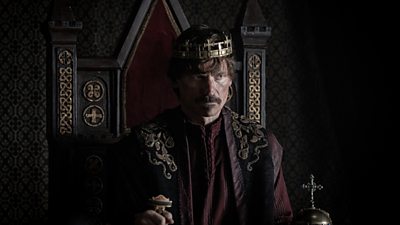
How did you feel when you were reading the King & Conqueror scripts for the first time?
It's such a compelling story about these two men who at first you think that could be the beginning of a beautiful friendship, and then it becomes something quite different. I didn't know anything about this history, and once I started doing my research and reading about it, I was really surprised by how different Europe looked back then and how the influence of the Normans, the Vikings, how great that was at that time. I love history, I find it very interesting.
Can you talk more specifically about the research that you did for the part?
I was just trying to read up, finding books about this specific time. There's very little written because it's so, so far back. I have this miniature version of the Bayeux Tapestry, which is quite extraordinary because it's so detailed about how this thing happened and so much of it is actually in our story.
Where do we find William at the start of the story?
At the very start, he's in a very good place. He's had a pretty rough childhood. His father was killed early in his life. By the age of 16 he’d had eight assassination attempts on his life. He is first and foremost a warrior, a man who, from an early age, learned that power is taken not given. But at this point, he's the Duke of Normandy. He's secure. He has a very strong bond with King Henry of France. He’s married to the love of his life and she's pregnant. Life is good.
As an actor, what were the challenges of bringing this historical character to life?
You have to really ground it and remember, which I really believe, people haven't changed that much. People were the same, they go through the same things we do. When you watch any show, any film, you have to obviously be able to identify with what these characters go through. And even though this is life and death, you still have to make it personal and identifiable.
What is the relationship between William and Matilda like?
William and Matilda’s relationship is a beautiful love story. What was quite unusual was that there are no stories of other children! They seem to have a very strong marriage. They help each other – he's illiterate, he didn't read or write, so they're both on the same page as a strong team. It's a relationship that is surprising in many ways because it's so rooted in genuine love and understanding of who the other is. Clémence Poésy has such a piercing intelligence that she brings to the work and she lifted our scenes with her talent.

William’s a warrior, but he's also a husband and a father, can you tell us about this?
I think he doesn't want his child to go through what he went through – a childhood where people tried to kill him. When he has his son, the fear of the unknown is overwhelming to him. Once the idea of pursuing the English crown comes into play, it becomes all-consuming. It's very linked to his son.
It's about protection and safety, believing that "the more power I have, the safer my family will be." And also, this is hundreds and hundreds of years before Freud and psychoanalysis and all that came into play. He is given the information that the King Edward of England has appointed him heir to the throne. Then the king dies. He goes to claim what's his. It's a very straightforward logic. But I'd rather have people look at the show and go, "oh, why did he do that? He shouldn't have done that." Or "I can see why he would do that."
What was it like directing and being an executive producer on the series?
I've had the time of my life being able to jump behind the camera and direct episode 5. I've been doing this in front of the camera for 30 years. And then you realise you do pick up some stuff on the way. It's been very gratifying to work with actors in that way and realise that you can help because you share a language. As a first time director, I was embraced by both the crew and the actors with such encouragement and graciousness.
Why was the balance between action and drama important?
We want that balance in our show. On the surface, it's a very macho world with men trying to claim what's theirs and reach their objectives through violence and war. It's important that you don't get caught up in that too much. It has to be grounded in a reality, the emotional stakes have to be real. Mike [lead writer] did a great job of finding these moments where you get behind what might be a very one-dimensional portrait of people going to war.
It plays much more in the relationships that are within a family and the various characters. And we know, at the end of this, there might be a battle in some place called Hastings…
Why do you think the story of 1066 is still so relevant and discussed to this day?
It’s the birth of England, of the current English monarchy. William the Conqueror is the 26th Great Grandfather to King Charles III. He transformed England and his marks are seen everywhere to this day.
Emily Beecham (Edith)
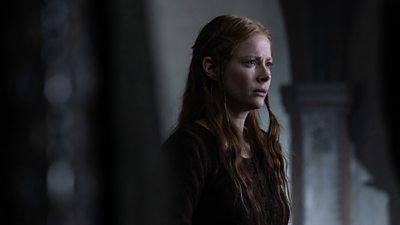
What drew you to the part of Edith?
The women are quite invisible in historical accounts of politics, art, and history, but within this story there's an angle on the female characters’ input alongside the male. There is a lot about Harold and Edith's romance, they have a complicated relationship. I really wanted to work with James – we've been acquaintances for a long time and he's a very spontaneous and fun actor.
It was quite a juicy script so I hope it's entertaining to watch Harold and Edith together. James has an infectious energy, and as a producer he also brought a great camaraderie to it. All of us cast are still friends today. I enjoy that time period in particular – I think it feels like things are on a knife edge. It's a very big time in history.
How did you prepare to play Edith?
The information on Edith was a bit limited and contradictory. Edith the Fair, Edith Swan neck, there are various names for her. Who was Edith to Harold was what I had to figure out. Her marriage to Harold wasn't recognised by the church because they were married in the Danish style, which put her in a very vulnerable position. Coupled with Harold's hungry ambition, I think it made for the turbulent drama that we all like on our screens and not in our real life!
Obviously, some of the intimate parts of the story are fictionalised because we can’t know what went on behind closed doors and the historical accounts are limited when it comes to the intimate parts of it. It was a really fun task, to try and make it as real as possible, keep people invested and understand their conflict when she's losing Harold to his ambition and ego. There is a tug of war between them. Trying to understand a woman of that period with the limited information we have… how they had any feelings of autonomy or how they navigated their life with very little security but their husbands. You have to really be on your toes!
Was there anything surprising you learned about Edith during your research?
She is often remembered in association with Harold, but what I've found out about her was that she was a landowner and she must have had her own political instincts in ways. Obviously I'm not saying anything new, that women in historical accounts are generally erased or ignored, so we're filling in gaps here, but with as much truth and realism as we can.
How would you describe Edith?
When we meet her there is a very physical and emotional charge between her and Harold. I thought of the Harold character as a bit of a bear – there's a rage and ambition in him that she's constantly trying to temper and redirect into a way that protects the family and her security. So, the desire and betrayal between them felt real, it felt human. That’s where we find her at the start of the series, full of uncertainty right from the beginning.

Did the costumes, hair and makeup help immerse you in the time period?
The Middle Ages and Anglo-Saxon look felt quite mythic. The long hair is such a statement, and it physically gets in the way all the time. It's a character in itself. You're constantly eating it, the technicalities were very challenging with the wig! The dresses and the outfits too, you're kind of restricted by it but also it's got a movement to it, a natural and mythic vibe. They’re like tribes in a way – Clémence and Nikolaj have a very different colour scheme and visual. I think the Middle Ages are so gorgeous looking.
What was the atmosphere like on set?
There was a single shot of a scene where they get invaded and the camera follows all the characters around. On that day there were strong gusts of wind and we were in a big sand pit. We had to choreograph and rehearse it a lot because it was in one single shot, so we were getting blinded by the sand and rehearsing it with goggles on. It looked post-apocalyptic, because James was in a pair of shades, wielding this giant broadsword. It was ridiculous, he looked like a cheesy rock star.
I remember Clare [Holman] underneath the blanket in a corner of the room before each shot with plastic goggles on her face in a medieval outfit looking like some kind of odd steampunk. It was a very silly day. And Geoff [Bell] actually ate a real sheep's eyeball during a scene. There’s a scene where he's eating a sheep's head and he popped an eyeball into his mouth. I don't know if it's made the cut or not. Geoff is very spontaneous!
How was it working alongside James who was also an executive producer on the series? And what was it like working with the actors playing the Godwin family?
James has a great camaraderie and he did such a good job spinning a lot of plates – producing a show and playing a lead in it. He always brings out the attractive and ugly side of the character’s personality, which is the best acting to watch because it makes it edgy and exciting. I also feel like that's the best type of person to do romance scenes with, because you can just let your guard down and let chemistry happen. You need a lot of trust to be able to do these kind of things and to open up and to get physically and emotionally close in those scenes.
It felt like a family on set. I know everybody says that, but it's not always true! But this time it really did, and we still get together and have dinners together.
Why do you think the story of 1066 is still so relevant and discussed to this day?
It changed the shape of things in a huge way. And it’s such a downfall that Harold had. This identity, power, loss, and ambition and it sort of shot himself in the eye! It's the foundations of how we got where we are now.
What are you most excited for audiences to see in this series?
It's very cinematic and we made a real effort to find a human side to it, those quieter moments around the battle.
Clémence Poésy (Matilda)
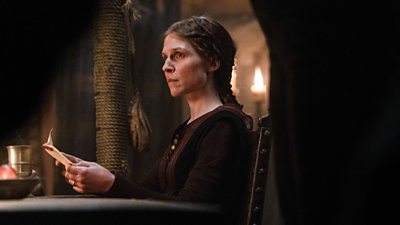
What drew you to the part of Matilda?
The fact that these women were there at the time behind these great men. It’s the curiosity of trying to figure out who they were when they’re forgotten because the men have stayed in the history books. It’s interesting and playful to explore these figures who are so unknown. It's very hard to figure out what the truth was, but we took the suggestion of Matilda as the more political side, and William as the warrior and the conqueror.
She's the one who knows about politics because she’s grown up in these families. What if it was a perfect union of both their strengths that has allowed for him to rule the way he did? There's even a scene where a letter is passed around and he doesn't even read it, he just passes it to her. She seems more aware of all the things at play, and probably never trusts anyone fully, apart from William.
The way she's introduced isn’t particularly friendly – she has a level of lucidity for what needs to be done to stay in power. She doesn't have issues about using force when needed, so she's quite unusual and complicated.
How would you describe Matilda and William’s relationship?
It might just be a very romantic thing, but we wanted to show this couple as something pure and strong. She's been raised by someone very twisted which has given her a lot of strength, but also a very horrible idea of the world and people. She’s met William and he has kind of healed that.
I think he's the reason she escaped something incredibly toxic, and so for him, she is ready to do anything. But she has kept the armour that she has built over the years, growing up in that court around people who were all trying to bring each other down. I don't think she wants power as much as William does, but she wants him, and he wants power, and she has the tools to navigate that.
How was it working with Nikolaj?
It was lovely, he's generous and caring – everything you want from an actor you're working with. When he was directing, it was even better because he was so excited. It’s nice when someone's like, ‘oh, let's make this thing together!’ There was nothing blasé about it. We all enjoyed having him tell us what to do!
But by the end of that episode I was like, ‘are you okay?’, because he'd been putting a lot of work into the directing of it all, and then he'd be doing this huge fight sequence which they’d rehearsed a lot. It's a lot, and shooting that in Iceland half naked in the mud…! But he was very happy while doing it, or he looked like he was!
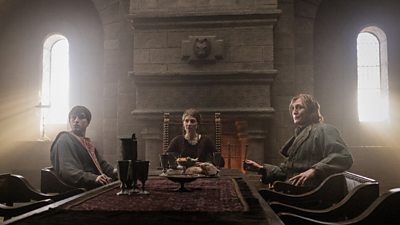
How did the sets and costumes help immerse you in the time period?
There was a rawness that gave the series a different energy that we wouldn’t have had in perhaps a more traditional setting. I've been doing this job since I was 16 and I'm 42, and I can never get over the fact that some people have these sets in their minds and then make them appear. The skills and the craft that it takes, I’m always amazed.
Why do you think people are still so interested in the story of 1066 today?
There's something thrilling about revisiting big historical moments and trying to play at what was going on in people's minds. You find the drama in the mystery. And whether you want to or not, you look at it from your perspective today. It's so hard to go back to the mind of the time. I think it's what happens with any book you read about history, is that it's looked at from where it was written from the country, the person, the time it was written.
What are you most excited for audiences to see in this series?
I think it's a good story! You can dive in it and it’s got so much. I'm excited to see what happens between the King [Edward the Confessor played by Eddie Marsan] and his mother [Lady Emma played by Juliet Stevenson]. I remember the readthrough being like, ‘oh my God, this is going to be amazing! I want to watch that’. Because of course, you do your bit, and you're in that zone, but the series is so big and generous in what it's offering as a story. It’s a real joy to just dive into.
Michael Robert Johnson (Lead Writer)
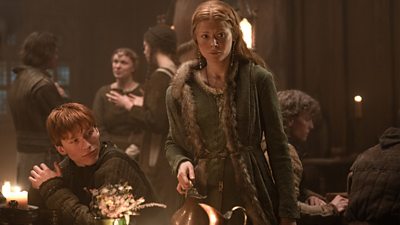
So why do you think this story is only being told properly now and why did you want to tell it?
It's a bit of a knotty story because it looks very simple and it's not, it’s very complicated. As one of our producers pointed out, even Shakespeare didn't have a go at it! Even though the themes are massively universal, nobody cracked the way to tell it. Ed Clarke, one of the executive producers, said the way to tell it was that there’s not a good guy or bad guy.
They're both good guys in their own stories who end up coming to face each other. That was the fascinating thing to me – I think good guys question whether they're bad guys, because that's how a moral compass works. But bad guys just think they're the good guys. It’s about people trying to solve their own little selfish problems and end up rewriting history. It's always interesting for me to delve into that.
What kind of research went into making the show?
First of all, it was reading accounts from the time. Or accounts of accounts from the time! They're all kind of contradictory, but it was a question of reading enough to work out what the interesting truths of the story were, the ones that people agreed on, and working out how that could be moulded into a story because you can't tell a straight documentary version. You can't just dramatise the facts because the peaks and troughs of the emotions are never in the right place.
To me, the most important thing is: what do the audience get out of this? We're asking them to invest eight hours of their lives, so how do we give them the best piece of entertainment we can from this incredible true story? And the second part of the research was trying to read as much about how the world would have been and get a good idea of what existed and what didn't.
William and Harold are often only shown as rivals. Could you tell us about their relationship before things became turbulent?
Historical figures don't go around thinking they’re historical figures. They're all just trying to deal with their own stuff. To me, it was just writing people who were trying to solve their everyday problems. Harold's thinking, ‘can William help me solve this?’ and William’s thinking, ‘can Harold help me solve this?’
It’s about the everyday. It makes sense that they become friends and then rivals through circumstance rather than personality. It also makes sense that they respected each other because they understood that the other one was dealing with a duplicitous enemy the same as they were, so they had common ground. As I say, nobody goes, ‘I will change history,’ but people do because they're trying to solve their own problems.
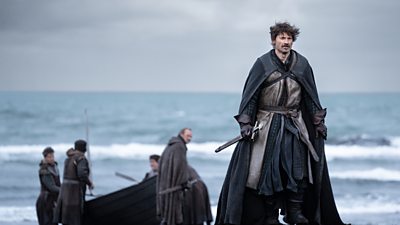
Could you tell us about the brilliant cast?
It’s an astonishing gift to have four leads in James, Nikolaj, Clémence and Emily, who were so good at understanding their characters. Watching the performances come together was astonishing. They were also incredibly good to work with – their notes were intelligent and perceptive, so if a scene was working, they would make it brilliant, and if a scene wasn't working, they would come back with ideas to make it better, which it always was.
Eddie and Juliet, even from the readthrough, it was clear what an astonishing double act they were as mother and son. After the readthrough we actually added another scene with them at the end of episode two. Bo [Bragason] is astonishing, she really got thrown into the deep end – in the first half of the series most of her scenes are against Eddie and Juliet, who are doing these huge performances. Lesser actors would have wilted under the intensity! Luther [Ford] and Ines [Asserson] did a tremendous job playing two people falling in love. It’s like trying to bottle lightning.
You hope you've written well enough for actors to spring off it. James was fantastic as executive producer. I cannot praise him highly enough. He’s a brilliant actor, but he's very good at protecting the script. Nikolaj had one of the hardest episodes to direct because he's got the most scenes, it's a pivotal episode. It was his debut directing experience and he's delivered a stormingly good episode.
Why is this story still relevant?
It’s the universal thing of love, greed, hate and ambition, all these things never change. When you're dealing with people with that level of power… they exist right up to today. We still have people starting wars and bloodshed to take or hold onto power.
The idea of what drives people to do these things is still relevant and important as a story because it's too easy to vilify people as demons. It's not a choice to be evil, but people become evil because of choices they think they have to make. Understanding why they make these choices, and what character flaws might be fuelling them, that’s what is interesting and relevant to me.
What are you most excited for audiences to see?
I want them to have the reaction I did when I first started getting into it, doing the research and thinking ‘I just want to see this story on a screen.’ I want the audience to have a good time and be entertained, laughing and crying with this story.
I'm excited for the prospect of them being as excited by the story as I am, because it's just such a tremendous story, brought to life by an incredible cast, brilliant directors and a really talented crew.
Kitty Kaletsky (Executive Producer)

The Battle of Hastings is such a crucial moment in our history, why do you think the story is only being told as a drama now?
There have been various attempts over the years to tell either the William the Conquer story from the Norman perspective, or the King Harold story from the Anglo-Saxon one. I think that's the key to it: to follow these men independently is interesting and there are a huge number of strands that spike out from each character, but it's not epic. Whereas in our show, we are exploring their parallel journeys, as their lives were in fact interrelated – Harold and William were related by marriage; and they were allies, and fought alongside each other. That is where the scale, adventure, and intimacy is unlocked, in combining these two interconnected narratives that are then hurtling towards that infamous end in the Battle of Hastings.
Other than the innate drama, from the character and action perspectives, this series is also – at least from a British perspective – about the dawn of a new nation and when everything changed for England and for Europe. Everything shifted after 1066 – language, law, culture in this country. People say quite proudly in this country that “we haven't been invaded since 1066” – it's been almost a thousand years – but it was in fact a colossal defeat for us, and it changed the very fabric of this nation forever.
Could you tell us about the kind of research that went into the making of the show? What were the surprising things that you discovered?
There was a lot of research that went into our development and production. We had a historical advisor on board as part of the script process, which was very helpful. But actually part of the pleasure of developing this show was that there is, on the one hand, a wealth of literature on the period, but on the other hand, there's also a tonne of disagreement between historians about the specific facts, as it was nearly a thousand years ago. So, we could find inspiration in different interpretations of history and that's an exciting place to be when you're creating drama, knowing that you're telling stories that are founded on a bedrock of truth, but also that there's an obscuring mist that allows you to take artistic license in a way that doesn't feel inauthentic or unethical, because there's only so much we can know.
I was amazed because we really weren't taught it in school that Harold and William were allies, two friends who become foes. And the importance of not just the love between the two couples – William and Matilda, Harold and Edith – but the extent to which these women acted as counsellors for their husbands was really surprising to me. Matilda, especially, was an incredibly well-educated strategist. William was illiterate, and she took him through all of the correspondence through his career – the ultimate advisor.
Why did you want to make King & Conqueror?
It’s part of the DNA of Rabbit Track to make intrinsically British or European slanting shows. What we are often drawn to, and King & Conqueror perfectly exhibits, is a Trojan horse story where you think you are watching a series about something big, unique and meaty – like kings and queens, epic battles and the changing of a nation – but actually it's a way to explore more universal themes of marriage and family dynamics or the relationship between fathers and sons.
What it means to be sent off on a collision course that was not the plan for your life. That happens with both Harold and William, because they didn't want the crown at the start and it becomes this toxic goal that ultimately poisons them both. James and I are always looking for projects that encourage the viewer to think you're going to get one thing, and you are, but you're also going to get a whole lot of other things that are going to grip you til the end as well.
Could you tell us about working with James, both as an executive producer and starring the series?
It’s a total joy working with James and a real thing to behold when he so expertly manages to flip between the character that he's playing and wearing that executive producer hat. He's at once incredibly opinionated, articulate and creatively led, but also never the loudest voice in the room and is really deferential to the other people that we're working with. It shifts when he's on set - we wear different hats because he has to devote himself to the role and to the character - but he never totally switches off because he knows it's his production and that he has a responsibility not just to the project, but to the cast and the crew to sort of hold his head high.
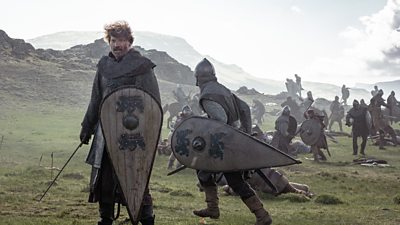
Please tell us about the casting process.
We felt incredibly lucky to get this cast and to be working with legendary Dixie Chassay as casting director. We obviously had James [Norton] attached from the start and Nikolaj [Coster-Waldau] was the first person we approached for William. Then came Emily [Beecham] and Clémence [Poésy], who elevated the show and brought it such intimacy and sophistication. The intensity and ruthlessness in Clémence’s version of Matilda felt fresh, and really influenced the way Mike [lead writer] kept writing the series. And similarly, the softly spoken ferocity Emily brought was a new version of Edith that we hadn't anticipated, and brought such life to the screen. The four of them had a huge amount of fun during filming. They formed a real bond, both as individual couples and as a foursome, and that just trickled down. As a result of that dynamic, the whole cast became incredibly close.
Luther [Ford] and Bo [Bragason] as the younger generation of the Godwinson family – the electric banter, with Sweyn played by Elliot Cowan, that you see around the table was thanks to their spirit and their brilliant performances. Similarly, Elander [Moore] and Indy [Lewis] playing brother and sister, Morcar and Margaret, there's a creepy, obsessional love between the two of them which is at once very unsettling and also impossible to look away from.
Jason [Thomas] as Thane Thomas, Harold's right-hand man, there's a beautiful confident quality between the two of them, especially as Tostig is losing his mind, and himself. And the love story between Luther and Ines (who play Tostig and Judith), it totally breaks my heart. Then obviously, having Juliet [Stevenson] and Eddie [Marsan] on board as our ousted queen and king was the most exceptional privilege, not just because of the power of their performances, but also the comedy that they bring to them. There’s an intensity to their characters’ mania, but they’re also such natural comics.
The costumes are incredible! How did they come to life?
Magga Einarsdottir [costume designer] has an extraordinary attention to detail. Her commitment to authenticity was such that actors were each wearing multiple layers every single day – fabric and then leather and then more fabric! The women had their waists cinched in the accurate way, and the men were wearing real chain mail at points and real leather all of the time.
Why are the events of 1066 so relevant to today and what do you hope audiences to take away from the series?
There's the fact that the Bayeux Tapestry is returning to England [in 2026] after nearly a thousand years. So, it feels all the more relevant now. But more broadly, 1066 and William’s victory was arguably the start of English history as we know it today, because we went from an Anglo-Saxon nation to a Norman one, in other words, an intrinsically European nation, and what follows the invasion changed everything.
The Bayeux Tapestry was doing what we're doing now – it’s a cartoon, a clear story that maps the beginning to the end of Harold and William’s journey.
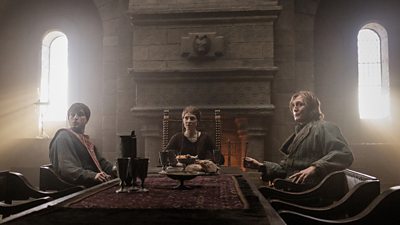
King & Conqueror is created and executive produced by Michael Robert Johnson and executive produced by James Norton and Kitty Kaletsky for Rabbit Track Pictures, Baltasar Kormákur and Magnus Sigurdsson for RVK Studios, Robert Taylor for The Development Partnership, Dave Clarke and Richard Halliwell for Shepherd Content, Lindsay Martin for CBS Studios, Ed Clarke and Nikolaj Coster-Waldau. Baltasar Kormákur directed the premiere episode and, as executive producer, has steered the creative across the series. King & Conqueror was acquired by Sue Deeks, Head of ��ѿ��ý Programme Acquisition.
Follow for More
Drama
Search by Tag:
- Tagged with Media Pack Media Pack
- Tagged with Drama Drama
- Tagged with Latest News Latest News